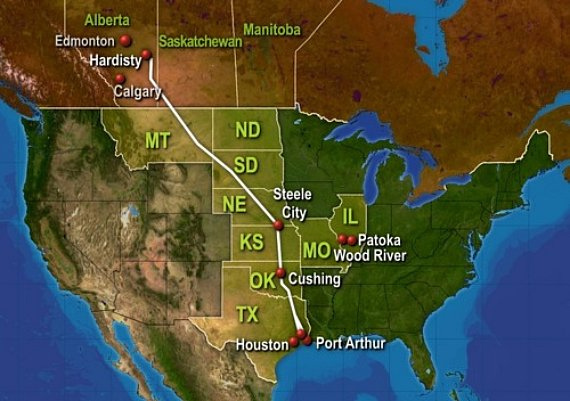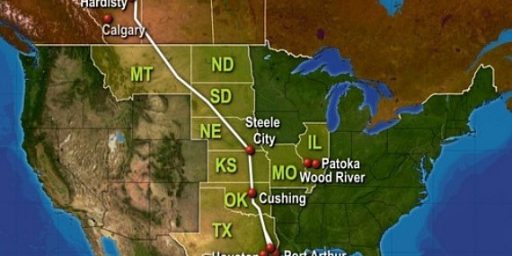TransCanada Asks For Delay In Keystone XL Pipeline Review
Another piece of news that all but guarantees the fate of the Keystone XL project will not be resolved before President Obama leaves office.
The Keystone XL pipeline, which has been delayed for years due to court fights and applications for government approval in the United States, seems likely to face another delay now that the company behind it has asked the State Department to put the current phase of its permitting process on hold while it negotiates to change the route it would take through parts of Nebraska:
The company behind the Keystone XL pipeline on Monday asked the U.S. government to suspend its permit application, throwing the politically fraught project into an indefinite state of limbo, likely beyond the 2016 U.S. elections.
In a letter, TransCanada Corp. asked the State Department, which reviews cross-border pipelines, to suspend its application while the company goes through a state review process in Nebraska it had previously resisted. The move comes in the face of an expected rejection by the Obama administration and low oil prices that are sapping business interest in Canada’s oil reserves.
“In order to allow time for certainty regarding the Nebraska route, TransCanada requests that the State Department pause in its review of the presidential permit application,” the Calgary, Alberta, company said in the letter.
TransCanada’s move comes as the State Department was in the final stages of review, with a decision to reject the permit expected as soon as this week, according to people familiar with the matter.
A State Department spokesman didn’t immediately respond to requests for comment. It must now decide whether to accept the company’s request or proceed with a final decision.
TransCanada in September signaled it was shifting its strategy when it dropped state legal challenges and efforts to seize land in Nebraska for the pipeline. Company officials hoped those moves would extend the review process in Washington—perhaps until a potential Republican administration in 2017 would approve the project—while details on the Nebraska portion of the route were worked out.
All Democratic candidates for president, including Hillary Clinton, say they are opposed to the pipeline. All Republican candidates say they support it.
President Barack Obama has said he has doubts about the project, saying it would create few jobs, not lower gasoline prices and possibly affect climate change.
The project also has faced unexpected resistance in Alberta, home to Canada’s oil sands, with the election in May of a left-leaning government that has adopted a lukewarm approach, and it lost an ally when Canada’s longtime ruling party lost its mandate in October elections, prompting the ouster of Prime Minister Stephen Harper. Prime Minister-elect Justin Trudeau has signaled support for Keystone XL but isn’t expected to make it a priority issue in U.S.-Canadian relations.
The pipeline as proposed would span 1,700 miles across six states and move as many as 830,000 barrels of oil a day, mostly from Canada’s oil sands to Steele City, Neb., where it would connect with existing pipelines to Gulf Coast refineries.
As much as 100,000 barrels of that oil would come from North Dakota’s booming oil fields.
TransCanada first applied for a permit in September 2008. The company has faced setbacks both in Washington and Nebraska, where opposition from landowners and environmentalists delayed the permitting process.
TransCanada has spent at least $2.5 billion on the project, whose total cost if built was estimated to be at least $10 billion due to delays and increased permitting costs.
The company has said it wouldn’t abandon the pipeline route as long as shippers continue to back it. The company’s chief executive, Russ Girling, has said Canadian oil producers want a more direct way to access the U.S. Gulf Coast.
No major oil-sands player has publicly backed away from a commitment to Keystone XL, but the urgency of market access as an issue has waned in line with the drop in crude-oil prices. The cancellation or suspension of several large oil-sands projects, including one abandoned by Royal Dutch Shell PLC last week, may further ease concern about limited pipeline capacity.
“The route in Nebraska has been uncertain for years, the only difference now is TransCanada knows they are about to have their permit rejected so they are scrambling,” said Jane Kleeb, executive director of Bold Nebraska, the organization fighting the project in Nebraska and around the country.
Given the way the process has gone so far, it was unlikely that the State Department was going to rule on the permit any time soon in any case. The matter has been delayed for most of the Obama Administration and there’s every reason to believe that it would have been delayed until after the 2016 election. Hillary Clinton, of course, has come out against the project after spending months dodging the issue, but that doesn’t necessarily tell us how her Administration would actually handle the issue if she were elected President. As it stands, the oil in Alberta and the Dakotas is going to be extracted, and it’s going to have to be delivered to refineries somehow. Given the available options — truck, train, and pipeline — a pipeline is both safer and more environmentally friendly than the other two, and carries the lowest risk for accident and damage to surrounding areas. Additionally, there would clearly be economic advantages to the pipeline itself both in terms of the jobs that would be gained during construction, that would later be needed when it was operational, and that would be needed for supporting industries as well as the potential that the project would help turn the United States into an oil exporting country. That last part would require Congress to change the law, but there seems to be strong support for such a change in both Houses of Congress and by both parties. None of it will mean anything, of course, until the pipeline is approved.
It’s possible, of course, that the Administration will deny the request for the delay in the review process and proceed forward, but this seems unlikely, the entire history of this process in the Obama White House has been one of essentially continuing to punt the matter down the field at every available opportunity. No doubt, this is due to the fear of potential political consequences if the permit is denied at this point. While Hillary Clinton likely helped herself when she announced her opposition to the project, polling of Americans more generally has shown strong support for the plan and it’s unlikely that the President and the Democratic Party would want to risk the political consequences of a denial at this point, both for Clinton’s anticipated General Election campaign and for Democratic hopes of retaking control of the Senate next year. Given that, the most likely outcome here is that the request for a delay will be happily granted.



I never understood why of the three option, 600 miles to Vancouver, 1000 miles to Thunder Bay, or 3000 miles to TX the latter one was the most attractive.
The pipeline would run right across the Carrizo-Wilcox Aquifer in Texas, which is the water supply for me and about 12 million other people. No thanks, I’ll pass.
Even more than the foofaw about possible pollution: with the present price of gas it just isn’t economically feasible any more.
There have been a couple of obstacles. Number one was the continuing court fights in the very red state of Nebraska and number two the fact that the tar sands are not even close to economical with oil at under than $50 a barrel.
There have been a couple of obstacles. Number one was the continuing court fights in the very red state of Nebraska and number two the fact that the tar sands are not even close to economical with oil at under than $50 a barrel.
@grumpy realist: Vancouver and Thunder Bay were opposed by Canadians and with Trudeau’s win Vancouver is out and Thunder Bay questionable. Texas wants it. http://www.thestar.com/news/canada/2015/09/10/liberal-leader-justin-trudeau-talks-pipeline-politics.html
@grumpy realist:
Bingo.
aside from politics and the fact that market prices do change (which is a whole nother topic I could get into) Vancouver and Thunder Bay were never that viable from the beginning. Logistics and market options were a huge handicap for Thunder Bay. Vancouver had a little promise to it, but after the California Air Resources Board came out with their draft on Cap and Trade, that kinda (still possible, but not likely) ixnayed tar sands from ever coming to California. As far as the rest of the pacific rim, it didn’t fit because of the lack of hydotreating and coking capacities….again, limited market options. Cushing, Ok. was the best option, both from logistics and market options. Still, oil sands crude (bitumen) is a very heavy and viscous product that won’t flow in a pipeline without a lighter hydrocarbon being injected into it. It is also a very corrosive product that requires special seals that most pipelines do not have….hence the concern going over aquifers…..or just land period….